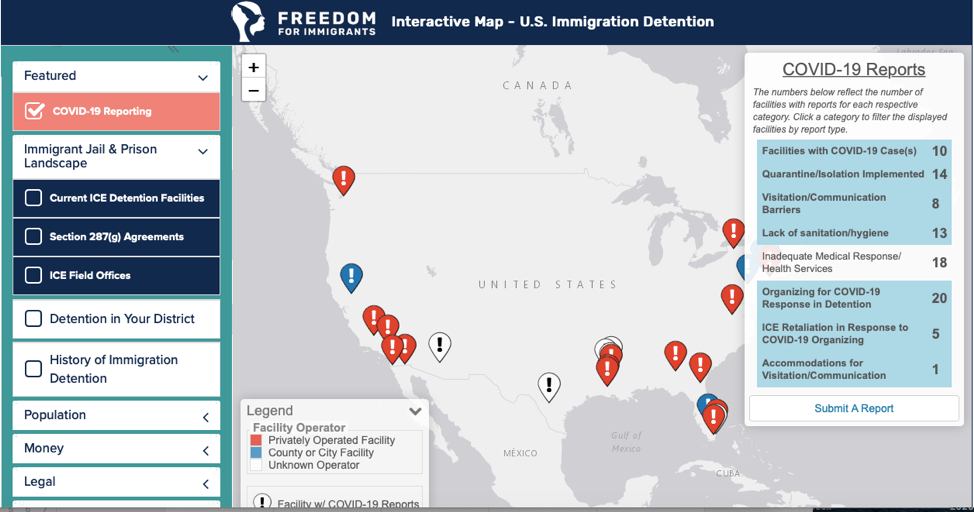"We know that someone will die because CCA is not equipped to handle a crisis..."
This excerpt is just one of the dozens of reports now featured on Freedom for Immigrants' interactive map following the launch of its COVID-19 hotline one week ago today. Posted on April 3rd, the statement above came from a detained person at the Otay Mesa Detention Center in San Diego, CA.
The spread of COVID-19 into crowded detention centers is a ticking time bomb: a largely helpless and highly vulnerable population is being explosed to this extremely contagious and deadly virus. As of today, ICE has confirmed 35 cases of the virus, 34 spread among 11 detention facilities from New Jersey to California, and one in a Miami hospital.
Our fears for the safety of immigrants in detention are amplified by the fact that they are more isolated than ever before. On March, ICE declared a halt to social visitation. Not only can family members and friends no longer visit their loved ones, but volunteer groups that monitor conditions and abuses are banned as well.
To date, Freedom for Immigrants has catalogued a total of 131 reports and complaints. Eighty-nine are currently accessible through Freedom for Immigrants' interactive map (shown below), sorted into eight categories: Facilities with COVID-19 Case(s), Quarantine/Isolation Implemented, Visitation/Communication Barriers, Lack of Sanitation/Hygiene, Inadequate Medical Response/Health Services, Organizing for COVID-19 Response in Detention, ICE Retaliation in Response to COVID-19 Organizing, and Accommodations for Visitation/Communication.

The information has been compiled from calls to our free hotline, reports submitted to us online, and information gleaned from a variety of news reports. If you have information about COVID-19 at a specific detention facility, please submit it here. Advocates and loved ones of people in detention are urged to call our COVID-19 Detention Hotline at 209-757-3733 to report instances of abuse.
At South Louisiana Detention Center, women report that soap is limited in supply with 12 ounces of liquid soap provided one week, then four the next. They have to use the soap while shaving, showering, and, most importantly these days, washing their hands. If they run out, bars of soap at the commissary cost about $2.
And this report from the Imperial Regional Detention Facility in Calexico, CA was posted on April 6th:
"Peaceful hunger strike. Retaliation - took away privileges - library, recreation, law library. ICE began to search individuals multiple times a day and take away property (legal paperwork, pictures, hygiene products) and commissary. [person detained] eventually broke the hunger strike to get his legal paperwork back per his attorney's recommendation. [Person detained] trying to get copies of grievances they had submitted in the past but when he asks for copies they don't give them to him. Everyone in Unit [ ] was moved to Unit [ ], which was filthy when they moved them in; there was blood on the walls and feces in the showers; nothing had been sanitized..."
At the Adelanto ICE Processing Center, one of the largest immigration detention centers in the country, a report notes that soap is provided for free, but is not antimicrobial. The one antibacterial canister for the whole block is "always empty." As of April 5th, only one guard was seen wearing a mask. Those detained no longer have outdoor recreation, and have not been provided any information from the facility regarding the virus. No measures have been taken to secure social distancing guidelines.
An April 7th LA Times article reports that ICE is beginning to release some people in detention who are at risk for the deady virus. The article notes that in the last week a U.S. District Judge has ordered 10 people to be released from Adelanto, and "In recent weeks, federal judges across the country have ordered the release of over 40 detainees." Another LA Times article says that California has begun processing 3,500 detained people for early release over the next two months. And today, the ACLU announced that a federal judge has ordered the release of four people detained at two California facilities, the Yuba County Jail and the Mesa Verde ICE Processing Facility.
While heartening, these numbers are but a tiny fraction of the total population of immigrants in detention, currently estimated at 33,863. Given the rapid spread of the highly contagious virus, most, if not all, are at risk of contracting it.
“The danger posed to the safety and well-being of people who are in ICE’s custody cannot be overstated,” said Co-Founder and Co-Executive Director, Christina Mansfield. “Because ICE has cut off all social visitation, the COVID Detention Hotline and our exhaustive national mapping effort are key to ensuring some measure of accountability for how ICE is handling and responding to the virus in real time. We will use the collected data to confront ICE’s lies that the agency can guarantee the safety of everyone in its custody.”

